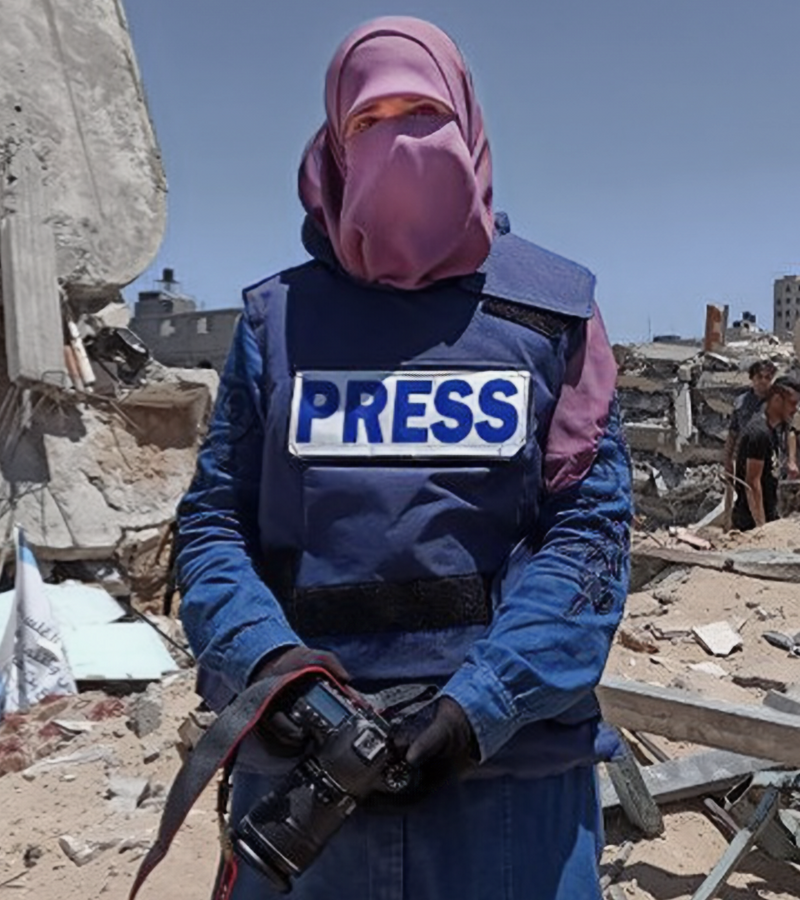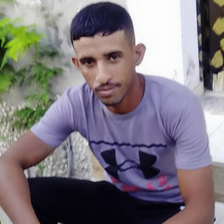The Electronic Intifada 21 May 2025

Wafa Aludaini in Beit Lahiya, northern Gaza, in June 2021.
In July 2019, I was walking with my friend Mohammed down Omar al-Mukhtar Street in Gaza City while enjoying a cup of coffee and some chocolate.
I told him how I wanted to defend the Palestinian cause in the English-language media.
Mohammed then told me about Wafa Aludaini, a well-known Palestinian journalist who led the 16th October Media Group.
The 16th October Media Group trained university students in media skills like writing human interest stories and news reports, scriptwriting, translating political terminologies and hosting discussions and seminars focusing on the Palestinian cause.
He added that Wafa was always willing to mentor young Palestinians.
I decided to visit her the next day at her office near Al-Aqsa University.
Wafa welcomed me and offered me juice and cupcakes, though I was too shy to accept them at first.
I explained to her why I wanted to become a journalist and media professional and asked her to train me. Wafa listened attentively and agreed.
“I want you to stay passionate and fearless, as this path will be challenging,” Wafa told me.
I said that I was ready, and that is how I started my mentorship with Wafa.
Wafa and I would exchange ideas and brainstorm to find a compelling story to focus on each week.
We would choose a topic centered around Palestine, such as the significance of sacred sites like al-Aqsa mosque, the implications of Biden’s election, the ongoing suffering of Palestinian detainees in Israeli prisons, or even the use of incendiary balloons to disrupt business as usual in Israel’s settlements near Gaza.
Then she had me write a video script and rehearse it well before we recorded it in the field.
The kind of assignments I did under Wafa’s mentorship varied. I learned to produce news reports and human interest stories by interviewing people on the street and recording documentary footage.
On the days we did fieldwork, I often woke up at the last minute and would get dressed before rushing off to Wafa’s office without having had anything to eat.
Wafa would ask me before we headed out on an assignment: “Did you have breakfast, Yusuf? I don’t want you to go on an empty stomach!”
I would reply that I was fine. But Wafa would scold me gently and insist that I eat something first.
She would buy me a cappuccino and a big bar of chocolate – my favorite treats.
Her mentorship came from the heart.
I remember being nervous while recording a report on Joe Biden being elected US president.
We filmed the report in the street in front of Al-Aqsa University. I was still struggling as I feared speaking in front of a camera and English wasn’t my first language.
“It’s just because you’re not used to the camera yet,” Wafa reassured me. “You’ll get better, and soon, you’ll be the journalist you’ve always dreamed of becoming.”
Tough love
On 29 May 2021, on the heels of yet another Israeli offensive in Gaza, Wafa and I were on our way to document the destruction caused by the massive bombardment in al-Wihda Street, the heart of Gaza City.
She was exhausted as she had already put in hours of effort since the early morning.
I told her: “Don’t trouble yourself – you’re already so tired.”
She replied: “Yusuf, I need to help you become who you’ve always dreamed of being. Get it together and let us see you working in a respectable position. That’s what will make me happy and free me from this exhaustion.”
I was overcome with emotion.
She turned around, noticed and said with a laugh, “Ya Allah ya Yusuf – what’s wrong? You’re crying in front of the university students! Don’t let anyone see you! Wipe your tears before they start laughing at you!”
I laughed a bit and tried to stay composed. But the tears came anyway.
Then she teased, “Alright, stop crying and be a man!”
We laughed together and went to do our task.
Wafa was supposed to leave work at 2 pm that day, but she stayed to assist me until we finished at around 4:00 pm.
I walked with her to find a taxi to take her home. As she got in the car, she waved goodbye and said with a wink: “Take care, soft boy.”
Aspirations
In late January 2022, after three years, I reached the end of my training with Wafa.
Moving on was bittersweet, but it was time to hone my skills and seek new opportunities.
As I was about to leave her office, Wafa said to me, “We’ll miss you so much, our student from Shujaiya. I hope that one day you’ll return to teach my students – to guide them on how to become the best journalists and writers they can be.”
“Always stop by the office,” she admonished me. “I’ll be waiting to chat with you about your new achievements – and celebrate over a cup of cappuccino and a big bar of chocolate.”
Wafa had her own aspirations.
She once told me that she dreamed of buying her own car, so she can save time and energy when reporting from the field.
She also envisioned a new website where Palestinian youth could share their experiences under Israeli occupation and receive support from a charity that would help Palestinians sustain themselves through their writing.
I once asked Wafa how much she loved her work.
“I nearly refused my husband when he proposed as he wanted me to give it up,” she replied.
But her husband, who preferred that she stay at home, came to understand as she considered her work a sacred responsibility toward the Palestinian cause.
Wafa’s message
In my last call with Wafa in March 2024, she asked me: “Please pray for me if I fall victim to this ongoing injustice in Gaza.”
“I will,” I promised her. “Always.”
On the last day of September later that year, my friend Fathi sent me a WhatsApp message: “Have you read the news today?”
My heart sank. I knew something horrible had happened.
“Is it someone I dearly love?” I replied.
He answered after some pause, “Yes, it’s her, Yusuf.”
“Her?” I repeated, my stomach sinking.
“Your friend. Your support, Wafa, was killed an hour ago. May her soul rest in peace forever,” he answered.
In the wake of her death, I was weighed down by grief and stayed quiet and depressed, unable to even speak to my family.
The loss of my beloved mentor pressed on my chest, suffocating me.
I thought about all the memories and good times we used to have together.
Wafa’s memory continues to push me forward on the path she guided me through at the beginning of my journey.
Her message to me was clear: “Give voice to the voiceless, expose the truth and never stop demanding justice for Palestine.”
We may have lost Wafa as a powerful voice for Palestine, but her legacy endures.
I will carry her message with me until my last breath, for it is a cause worthy of everything we can give.
Yusuf El-Mbayed is a freelance writer and reporter working with charity organizations in Gaza.



